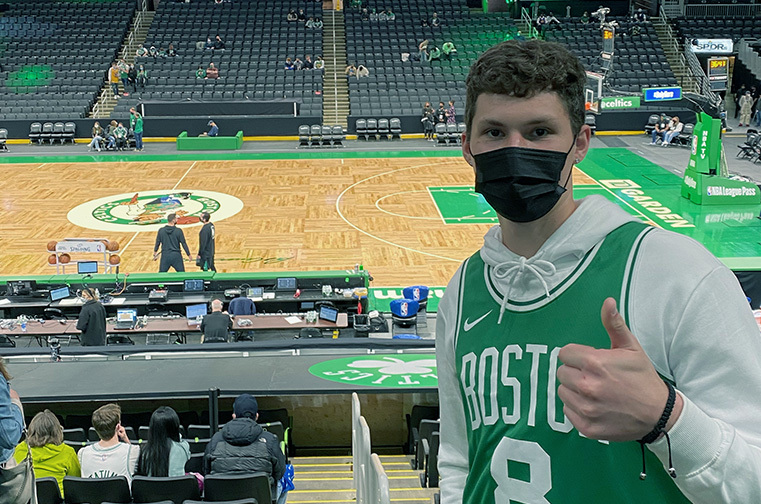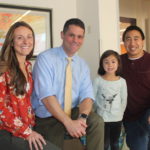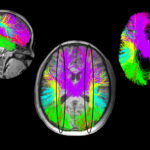Another shot for Conner: Getting back in the game after brain surgery

Watch Conner Hicks coach basketball at Midlakes Middle School in Clifton Springs, New York, and you’ll see a young man with a passion for the game. Talk to the players on his team and you’ll hear about a dedicated and enthusiastic role model. What you probably won’t notice is the 19-year-old’s fight with a brain disease that caused nine significant strokes.
Conner remembers the first seizure he had when he was just 5.
“I was playing T-ball,” he recalls. “I was running to second base and I just sat down. The whole world started spinning.”
Conner learned that he had had a stroke. Over the next few years, he had several more. One, when he was 12, stays with him almost seven years later.
On a car ride to Buffalo, New York, Conner and his family were discussing the upcoming school year. He tried to ask about picking out supplies — one of his favorite parts about going back to school.
“I just couldn’t say the words,” Conner says. His family recognized his struggle as a sign of another stroke. What followed were appointments with multiple specialists and Conner being diagnosed with moyamoya disease.
Moyamoya is a rare disease of the blood vessels that feed oxygen to the brain. It causes the vessels to narrow, which cuts off blood supply and can lead to severe complications such as stroke. The term moyamoya means “puff of smoke” in Japanese. From a medical perspective, this refers to the appearance of the vessels the brain grows to make up for reduced blood flow. The “puff” is visible on a patient’s X-ray.
Finding answers
Soon after his diagnosis of moyamoya, Conner’s parents started researching the best treatment options and found the Moyamoya Program at Boston Children’s Hospital. There they met Dr. Ed Smith, director of Pediatric Cerebrovascular Surgery.
“He’s the best,” Conner says. “From the moment I met Dr. Smith, I felt a connection. I didn’t look at him as a doctor, I looked at him like a friend.”
Dr. Smith performed pial synangiosis surgery to reroute healthy blood vessels from Conner’s scalp to his brain, bypassing the vessels narrowed by moyamoya.
Pial synangiosis was developed and first performed at Boston Children’s nearly 40 years ago. Today, it’s the primary treatment for moyamoya disease. While recovery is different for every child, Conner found getting back to his old self to be a slower-than-expected process.
“I’m a person who likes to do stuff. I always have to be doing something,” Conner says. “But after I had my surgery, I couldn’t do anything really for about eight months. I couldn’t play sports or even go to school.”
Getting back in the game
Slowly, Conner regained his strength. Eventually, he got back to attending seventh grade in person for full days.
“It was awesome to be able to start to do things again,” says Conner. “I remember going to play baseball for the first time. It was great.”
Today, Conner is all in on being busy. But because of the nature of his surgery, he takes precautions to keep himself safe.
“My head is very fragile, so I have to be cautious,” he says. “But really, I’m only limited to what I feel I can’t do.”
Today Conner is in college studying physical education and pursuing his dream to coach college basketball. A dream he’s already embarked on as the coach of the seventh-grade team at his alma mater, Midlakes.
When he’s not studying, Conner is coaching, playing, or watching sports. His favorite team is the Red Sox, but really he says, “I’m everything Boston for sports. It’s my home away from home.” Just don’t tell his neighbors in New York.
Learn more about the Moyamoya Program.
Related Posts :
-

Advice for moyamoya families from a mom who’s been there
About a year ago, our 4-year-old daughter, Kalea, started having headaches. After four months, we called our pediatrician because the ...
-

Groundbreaking research identifies noninvasive biomarker for moyamoya in children
Moyamoya is a rare blood vessel condition that has an outsized impact on children, as it is responsible for about 6 ...
-

Unveiling the hidden impact of moyamoya disease: Brain injury without symptoms
Moyamoya disease — a rare, progressive condition that narrows the brain’s blood vessels — leads to an increased risk of stroke ...
-

What orthopedic trauma surgeons wish more parents knew about lawnmower injuries
Summer is full of delights: lemonade, ice cream, and fresh-cut grass to name a few. Unfortunately, the warmer months can ...





